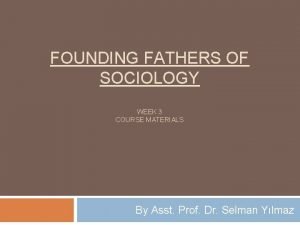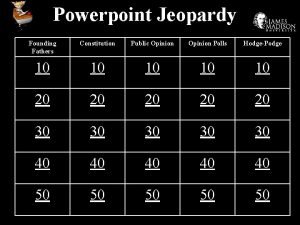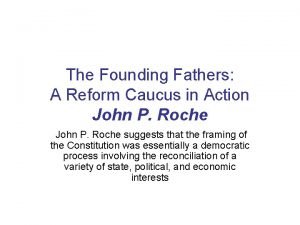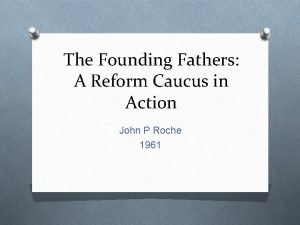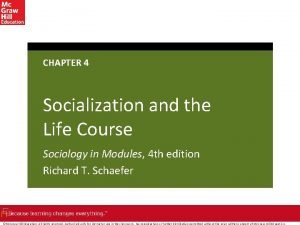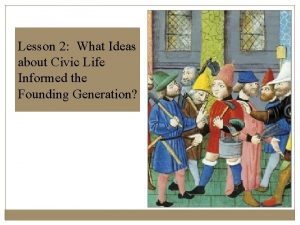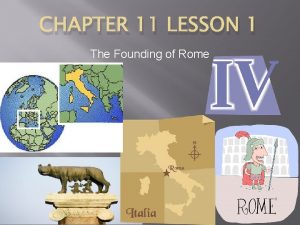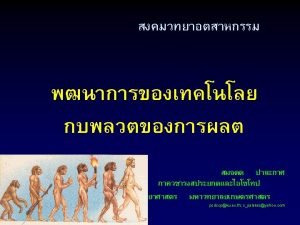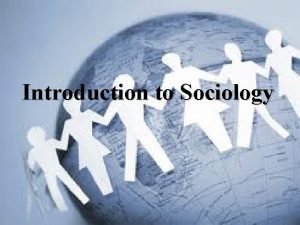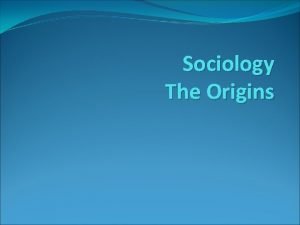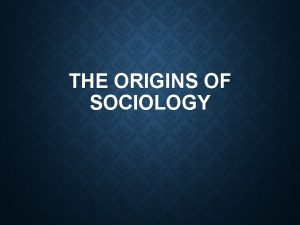FOUNDING FATHERS OF SOCIOLOGY WEEK 3 COURSE MATERIALS











- Slides: 11

FOUNDING FATHERS OF SOCIOLOGY WEEK 3 COURSE MATERIALS By Asst. Prof. Dr. Selman Yılmaz

Ibn Khaldun (1332 -1406) A Muslim scholar was born in North Africa and mostly lived there. A good observer. Compares primitive and modern societies. He would be considered as a prominent sociologist in modern sense but mostly not much known in contemporary academic world.

Alexis de Tocqueville (1805– 1859) Writer of Democracy in America (1835). Travel across America and cluster his observations regarding to political life in America. Great supporter of freedom. Have concerns regarding centralization of government.

Auguste Comte (1798– 1857) Coined the term sociology Positivism Evolutionary theory (law) of the three stages: � Theological stage, metaphysical stage, positivistic stage His sociology does not focus on the individual but rather takes as its basic unit of analysis larger entities such as the family.

Emile Durkheim (1858– 1917) Many scholars consider him as the real founder of sociology Interested in religion (this is a common ground for many early sociologists) Suicide (1897) Link such an individual behavior as suicide to social causes (social facts), by doing so he made a persuasive case for the importance of the discipline of sociology. The Elementary Forms of Religious Life (1912) Examined religion. primitive society in order to find the roots of

Karl Marx (1818– 1883) An action man. He did not want to only interpret the world but change it. Not particularly a sociologist. Interested in entire social world, specifically economy. Politic economist. Supported communism. Against capitalism. Labor theory of value, surplus value, exploitation of workers, inequalities, alienation, class conflict Religion is opium of people.

Max Weber (1864– 1920) The Protestant Ethic and the Spirit of Capitalism (1904) Concerned with the impact of religious ideas on the economy Focused on social class, the economic dimension of stratification. Religion is not merely an epiphenomenon. Instead, it had played a key role in the rise of capitalism in the West.

Georg Simmel (1858– 1918) Understanding interaction among people was one of the major tasks of sociology. � Poverty, fashion � Prostitute, miser, spendthrift, stranger

Sigmund Freud (1856 -1939) Psychoanalysis ID, ego, superego Subconscious Religion The Future of an Illusion (1927) Totem and Taboo (1930) Civilization and Its Discontents (1930)

Review Any further comments and questions?

References Ritzer, George (2011). Sociological Theory (8 th ed. ). New York: Mc. Graw-Hill.
 Founding fathers of sociology
Founding fathers of sociology Founding fathers powerpoint
Founding fathers powerpoint The founding fathers a reform caucus in action
The founding fathers a reform caucus in action The founding fathers a reform caucus in action
The founding fathers a reform caucus in action Week by week plans for documenting children's development
Week by week plans for documenting children's development Life course theorists suggest socialization
Life course theorists suggest socialization What philosophical ideas informed the founding generation?
What philosophical ideas informed the founding generation? America's founding ideals
America's founding ideals Founding principles of the scottish parliament
Founding principles of the scottish parliament Chapter 11 lesson 1 the founding of rome
Chapter 11 lesson 1 the founding of rome Discovering american ideals in primary sources
Discovering american ideals in primary sources Nam founding members
Nam founding members
